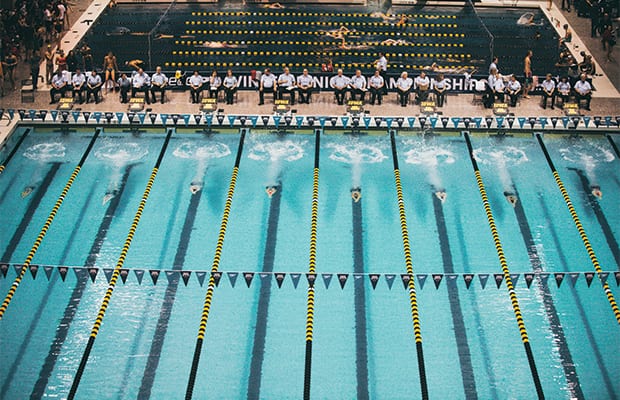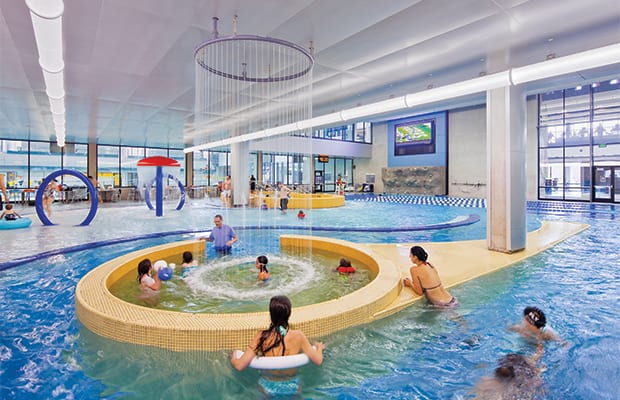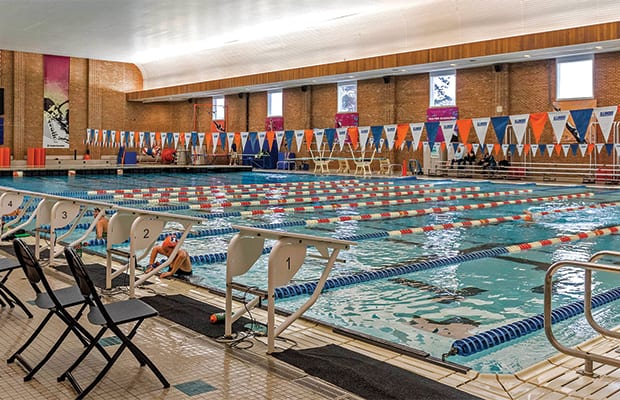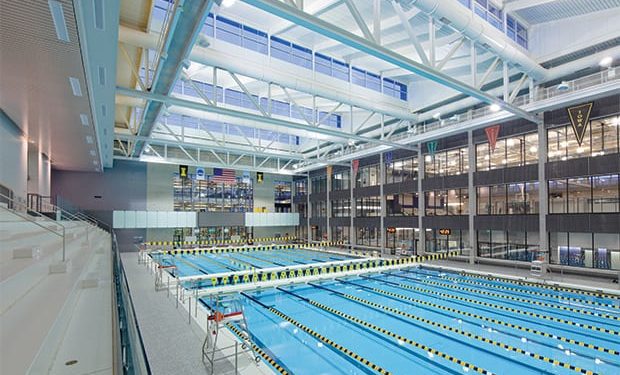This may sound like a no-brainer, but it’s important to keep your pools clean. Besides keeping your aquatics facility visually appealing, pool cleanliness — or lack thereof — can have quite an adverse effect on participation if neglected.
“Cleanliness is extremely important for the safety of patrons who use our facilities,” said Phil Julson, the associate director of aquatics at the University of Iowa. “The cleaner your facility, the safer and more attractive it is for patrons.”
Cody Demas, the aquatics coordinator at the University of Illinois, Urbana Champaign, echoed Julson. “It’s plain and simple: nobody wants to swim in a dirty pool,” he said. “Pools that are visibly suspect to dirt and high turbidity, or make users question whether they feel comfortable using the pool, won’t sustain the success that well-maintained pools will.”
Keeping pool water clean on a daily basis can seem tedious, but it can be the beginning of a culture of cleanliness that will significantly enhance your students’ aquatics experience. Clean pools directly attribute to a greater feeling of safety, as well as encourage students to splash around and have fun.
Impacting Safety
“The cleanliness of our pool has a great impact on safety,” said Demas. “It starts with having our pools free of debris and maintaining proper water balances so our lifeguard staff can see all aspects and depths of the pool effectively.”
According to Demas, pool cleanliness is some of the best help you can give your aquatics staff. As long as they can maintain strong visibility of everything and everyone in the water, they’ll have no problem using their training should they need to in an emergency situation.
“Our aquatics staff trainings continually incorporate best practices to defend against blood borne pathogens, how to perform proper clean-up procedures and what to do in case of accidental fecal releases,” said Demas.

Pool cleanliness doesn’t just stop in the pool. Maintaining clean decks, chairs and tables around the pool area can also lower students’ chances in encountering germs.
“Making sure surfaces and spaces are clean prevents the spread of illnesses, and helps ensure patrons do not get sick at our facilities, particularly since patrons are most often in bare feet or have more bare skin exposed when using pool facilities,” said Julson.
Affecting Participation
Have you ever second-guessed jumping in a pool once you saw a few leaves or clumps of dirt floating around in the water?
“Keeping the pool areas clean and neat provides for a more attractive space for users, which increases the likelihood students will want to use the facilities,” said Julson. “A cleaner facility is a more attractive facility.”
And more attractive facilities tend to be more highly thought of by the public. “We want our facilities to be clean in appearance so they are inviting to guests,” said Julson. “Not only that, but an unclean facility leaves the impression the facility is uninviting and also potentially unsafe.”
Making a good impression by presenting an inviting and safe aquatics facility falls to the culture of cleanliness you instill in your staff. Taking pool cleanliness seriously will elevate the performance of your facility — failing to do so will be detrimental.

“Playing host to users of all ages, we hold ourselves to a high standard aimed at keeping our facilities clean and operating as efficiently as possible,” said Demas. “Without instilling a culture of cleanliness, we would certainly expect increased safety concerns and lower participation numbers, and our aquatics staff would lose out on important development opportunities.”
Perception is reality, according to Julson. It will take a lot of cleaning to undo a user’s initial impression your facility is unclean and unsafe. “So much of managing an aquatics facility is the perception patrons have, and the level of cleanliness can contribute positively or negatively to a facility’s image,” he said.
Best Practices
Knowing how much pool cleanliness can affect the appeal and safety of your aquatics programs, you should fine-tune your daily, weekly, and yearly maintenance and cleaning schedules.
Remember to also keep your staff educated on the procedures you want implemented and informed on the ones you want to change. This constant and open communication will go a long way in establishing a culture of cleanliness in your aquatics facilities.
Here, in their own words, Demas and Julson describe the practices of their respective departments for maintaining pool cleanliness:
Demas: “We work closely with our facilities and services department on campus, who aid our campus recreation staff with daily pool operations. There are two representatives from the facilities and services water station staff who oversee the automated chemical balances of our three pools across two separate facilities, and document chemical readings twice daily.
“The collaboration between our facilities and services personnel and our aquatics staff ensures the pools are consistently operated within state codes and the certified pool operator standards set by the National Swimming Pool Foundation.

“In addition, our lifeguards have been taking on added responsibilities in maintaining the cleanliness of our deck, railings and lifeguard stations. Our building service workers are diligent in their practices to ensure our decks are scrubbed on a nightly basis and receive deep cleaning during our academic break periods.”
Julson: “The University of Iowa’s facilities management department has custodians who clean the pool areas every day, including weekends. We try to schedule them before pool hours begin so they have the best chance to clean the most area without interference from activities and programs.
“They have determined a routine schedule — daily, every other day and weekly, etc. — of cleaning duties, with certain areas needing more attention than others due to traffic and usage.
“We also have on-call custodial assistance for emergencies or needs outside of normal custodial hours. Our facilities, the competition natatorium in particular, are heavily used for events. We schedule additional custodial hours during and after event days to ensure spaces remain clean throughout events. This is extremely important not just for the events themselves, but also for the long-term cleanliness and maintenance of the facilities.
“It would be difficult to keep up with cleanliness over time if we relied solely on regular custodial hours to clean after events — the custodial staff would not be able to keep up with their regular cleaning schedule since events take a heavy toll on the building. As far as the cleanliness of the pool water itself is concerned, the University’s water plant follows strict water chemistry standards to ensure our water is balanced and meets public health code requirements. The pools are tested on a regular basis to verify pool chemicals are within appropriate ranges.”











You are doing a great job Man, Keep it up. This is the perfect blog for anyone who wants to know about this topic.Thanks for sharing this image with beautiful images.